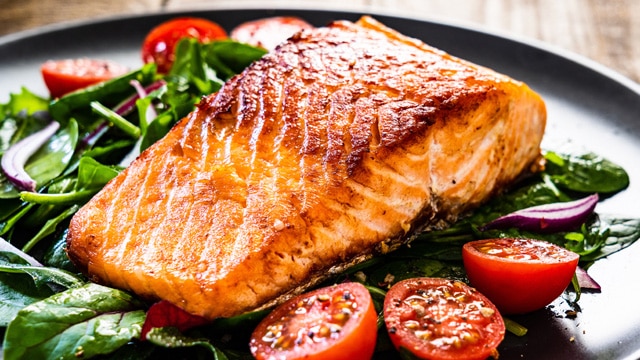-
-

BRUSHING & FLOSSING
How to BrushWhat Is the Right Way to Brush?
Proper brushing takes at least two minutes — that's right, 120 seconds!...

BRUSHING & FLOSSING
How To FlossWhat is the Right Way to Floss?
Proper flossing removes plaque and food particles in places where a toothbrush cannot easily reach... -
Science & Innovation
- Home
- Oral Health
- Foods That Cause Bad Breath: How To Battle Bad Breath


If you suffer from bad breath (halitosis) after eating, you’ll be happy to know that there are solutions at hand. There are many ways to combat smelly breath and still enjoy the foods you love. Of course, some medical conditions will cause bad breath, so it’s not always food or hygiene-related. But it’s good to be aware of foods that can cause bad breath. That’s why here, we’ve listed some of the main offenders, along with some downright handy tips for freshening up after enjoying them.
Why do some foods cause bad breath?
First up, all foods can impact your breath. When we eat, food debris can stick to our teeth and tongue, providing a nice meal for the bacteria in our mouth. When some bacteria feed on food, especially proteins, they produce compounds that give off an odour. On top of mouth bacteria, strong-smelling foods can also cause bad breath when they enter the bloodstream. But, you don’t have to avoid tasty, aromatic foods just because they affect your breath. There are products you can use and habits you can adopt to freshen your breath after each meal.
Garlic, onions and spicy foods
Lots of spicy foods, including chiles, peppers and spices, can give you bad breath.
Garlic and onions also can produce an odour long after you finish the meal. For example, according to the UNSW Odour Laboratory, garlic is a classic example. “Your body processes it into allyl methyl sulphide (AMS), which is then exuded as an unpleasant odour through your pores,” he said.
HANDY TIP: Chew sugar-free gum or brush your teeth after eating spicy or aromatic meals to help combat bad breath after indulging in the foods you love.
Coffee and alcoholic beverages
According to Queensland Health, caffeinated and alcoholic beverages can contribute to a dry mouth. Dry mouth does happen while we sleep, contributing to ‘morning breath.’ But when you consume drinks that dry out your mouth, you can suffer from a dry mouth and consequently bad breath at any time of the day.
HANDY TIP: Make it a habit to drink water before and after enjoying caffeinated or alcoholic beverages to help reduce dry mouth and freshen breath.
Tuna and other fish
Tuna and other fish are filling, high in protein, and delicious! However, tuna and other canned fish have a specific ‘fishy’ odour caused by the chemical compound trimethylamine (TMA).
HANDY TIP: Splash lemon or vinegar onto fish before eating. Acidic ingredients can help TMA bind to water, reducing its potency. Alternatively, chew some sugar-free gum or brush your teeth after eating to help with the odour.
How to fight bad breath
Remember, a proper oral care routine can help your breath smell fresh, even if you indulge in these aromatic foods and beverages. Brushing your teeth for two minutes in the morning and two minutes at night will help remove leftover bits of food and prevent plaque buildup. Plaque is a film of bacteria that coats your teeth if you don’t brush them properly, according to healthdirect.
And there’s more you can do! Cleaning between your teeth with floss, water flossers or interdental brushes - and rinsing with a mouthwash or antiseptic mouthrinse all help freshen your breath.
So don’t sit at home covering your mouth, feeling miserable. Get out there and enjoy life – and your favourite foods (in moderation). Just be aware of the foods that cause bad breath and all the clever things you can do to stay on top of it.
Related Articles

Acid reflux occurs when stomach acid moves into the oesophagus, leading to heartburn or regurgitation where sour or bitter acid backs up in the throat or mouth.

Bad breath can come from a number of places, but did you know you can get bad breath from stomach problems?

This article is intended to promote understanding of and knowledge about general oral health topics. It is not intended to be a substitute for professional advice, diagnosis or treatment. Always seek the advice of your dentist or other qualified healthcare provider with any questions you may have regarding a medical condition or treatment.
Related Products

Helping dental professionals
More professionals across the world trust Colgate. Find resources, products, and information to give your patients a healthier future








